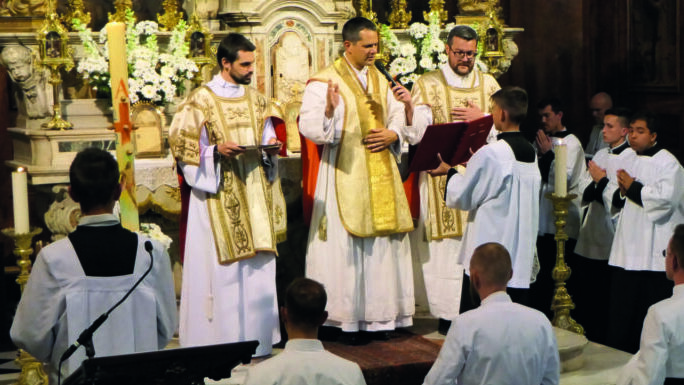
Photo: Courtesy of the Missionaries of Divine Mercy, Toulon
Some three years after the publication of the apostolic letter Traditionis Custodes, which aimed to restrict access by the Catholic faithful to the traditional Latin liturgy, the situation is still far from resolved.
In the diocese of Toulon, the ordination of several seminarians is still being suspended on the grounds that their congregation plans to celebrate Mass in the Tridentine rite.
The traditional Latin Mass, also known as the Tridentine Rite, Old Rite, or Vetus Ordo, is the form of Mass codified by Pope Pius V in 1570 after the Council of Trent, but based on liturgy of the Western Church as it had been celebrated for at least a millennium. It was largely superseded in 1969 by the modern Mass, or Novus Ordo, which was drawn up by a committee in the 1960s after the Second Vatican Council.
The diocese of Toulon in the south of France is known as one of the most dynamic in the country and one of the biggest providers of vocations to the priesthood. For many months, it was under close surveillance by the Vatican for failures of discernment in the recruitment of seminarians and shortcomings in the management of the communities by the bishop, Msgr. Rey. Ordinations were suspended until a solution to the crisis could be found, with the appointment of a coadjutor bishop alongside Msgr. Rey to take over his pastoral duties, which were deemed to be partially lacking.
Earlier problems of episcopal dysfunction are now in the process of being resolved. Ordinations have resumed, but not for everyone. Five seminarians from the Missionaries of Divine Mercy community have been waiting—more than two years for one of them and one year for the other four—to receive authorisation from Rome for their ordination to the diaconate and then to the priesthood. The reason for the blockage is the statutes of the community to which these seminarians belong, which stipulate that they must celebrate Mass in accordance with the traditional liturgy, i.e., the ‘extraordinary form of the Roman rite’ according to the terms laid down by Pope Benedict XVI which are now obsolete.
Despite the benevolent intercession of the coadjutor bishop, Msgr. Touvet, the superior of the Missionaries of Divine Mercy, Abbé Jean-Raphaël Dubrule, testifies to the obstinate blocking by Vatican authorities, both on the celebration of the ordination itself in the traditional rite, and on the possibility for future priests to celebrate in this form once they have been ordained. He explains:
It could therefore happen that candidates are ordained without having the right to celebrate afterwards according to the old ritual. They would then no longer be able to exercise their ministry within the community and in accordance with the statutes.
On the question of authorisation for the traditional liturgy, the Vatican is constantly blowing hot and cold. There are growing rumours of a new document cracking down on the traditional Latin Mass, spread by well-informed specialist press outlets such as the Rorate Caeli blog, which was the first to draw attention to the coming of Traditionis Custodes. A new text is said to be in preparation.
The American Catholic newspaper The Remnant gives an outline of its possible content. Backed by the Vatican’s Secretary of State, Cardinal Pietro Parolin, it has reportedly already been presented to Pope Francis. It would prohibit all priests other than those belonging to approved institutes from celebrating Mass in the Vetus Ordo. It would also prohibit bishops themselves from celebrating or authorising the celebration of the Vetus Ordo in their dioceses and would suspend existing authorisations granted by the Dicastery for Divine Worship and the Discipline of the Sacraments. The status of parishes currently entrusted to institutes remains unclear. The text is aimed particularly at the two countries where traditional communities are most dynamic, namely France and the United States.
While the world of Tradition on the web is buzzing with rumours, representatives of the Institute of Christ the King Sovereign Priest—a society of apostolic life celebrating the traditional liturgy—were warmly received in Rome on June, 24th. Pope Francis reportedly asked them twice during the meeting to continue to “serve the Church” according to “their proper charism”—which specifically provides for the exclusive use of the traditional liturgy.
This meeting does not contradict the possible directions of the new papal text—tolerance for institutes—but it does raise questions in the light of what the Missionaries of Divine Mercy in Toulon have to endure: why should they be forbidden what their statutes provide for? The exceptional integration of the Missionaries into the parish organisation of the diocese of Toulon could be one of the reasons for the Vatican’s mistrust of them, which is not the case for the establishments of the Institute of Christ the King Sovereign Priest: unlike parishes, these are ‘apostolates’ obeying their own rules.
The variations in the way the communities are treated, which are based on obscure logic and subject to interpretation by the faithful, make Rome’s current strategy with regard to the ‘traditional question’ particularly unclear. We therefore need to pay close attention over the coming weeks.
